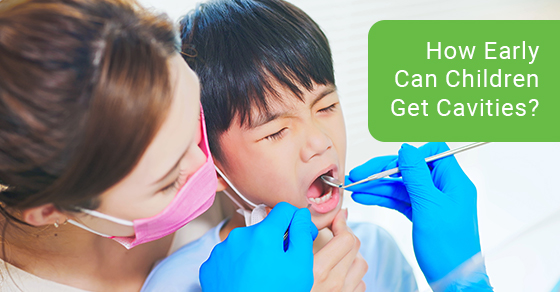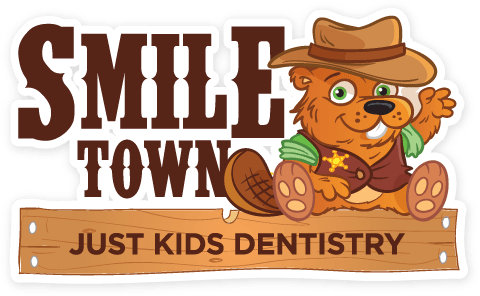How Early Can Children Get Cavities?
- February 13th, 2023
- Childrens Dental Tips
- Andrew Adams

A baby’s smile is one of the greatest sources of joy for their parents and loved ones. However, as pure and cheerful as an infant’s smile may be (and no matter how young they are), they are still susceptible to cavities if they have already started to sprout teeth.
In fact, baby teeth are even more susceptible to tooth decay than adult (permanent) teeth, as the enamel of baby teeth is much thinner and, therefore, more vulnerable to the harmful effects of cavity-causing acids.
With that being said, it is critical that a child’s oral health journey begins as soon as their very first tooth begins to erupt, with gentle gum care beginning before this stage.
In this article, we will address what exactly causes cavities (technically known as dental caries) in children’s teeth, in addition to the effective measures that parents can take to prevent childhood tooth decay from developing in the first place.
Understanding the Causes of Tooth Decay in Babies and Young Children
When it comes to the direct cause of tooth decay and cavities, a group of bacteria referred to as “streptococcus mutans” (or “s. mutans”) is responsible. When these bacteria are introduced to sugars in the mouth, including sugars present in breast milk, they produce a harmful acid that eats away at the protective outer layer of the teeth (the enamel), leading to the progression of tooth decay and, ultimately, cavities.
Interestingly, babies are not actually born with this bacteria present in their mouths. In fact, studies have shown that parents, usually mothers, will typically infect their child via salivary transfer before their child’s second birthday (for example, through sharing food from the same spoon or letting your toddler use your toothbrush).
However, aside from this direct cause of tooth decay that most of us have been exposed to at some point in our lives, there are several factors or habits that commonly contribute to the formation of tooth decay in babies and children, which parents should do their best to avoid.
The Top Contributors to Childhood Tooth Decay
The highest contributors to tooth decay in children include the following:
- Improper bottle use, such as going to bed with a bottle of juice, formula, or milk, or using the bottle as a pacifier, which exposes the teeth to sugars for prolonged periods of time.
- Eating a poor diet containing many sugary and processed foods and drinks (including snacking and sipping on such foods regularly). Bacterial acids can attack the teeth for as long as twenty minutes following each snack or meal, regardless of the food portion.
- Practicing poor dental hygiene care at home, including a lack of regular brushing and flossing.
- Not visiting the dentist regularly for check-ups and cleanings.
- Not receiving adequate fluoride exposure, which is a mineral proven to strengthen the teeth and make them more resistant to decay.
- Genetics is another top contributor. It is possible that certain factors, such as tooth shape/size, as well as salivary production levels, may render some children more susceptible to tooth decay than others.
Preventing Childhood Dental Caries
Preventing tooth decay in babies and young children is relatively simple, as long as parents take the right approach. In order to effectively prevent childhood dental caries, parents should adhere to the following guidelines:
- Using a clean wet cloth or piece of gauze, gently wipe your baby’s teeth, gums, and tongue after feeding or providing any medicine containing sugar, and do so before bed.
- Take your baby to the dentist as soon as their first tooth erupts or before they turn one year of age. Then, be sure to schedule regular dental check-ups with the dentist.
- Always avoid putting your child to bed with a bottle of juice or milk (as previously stated), and use a bottle only at feeding time. Additionally, try to wean your baby from a bottle to a sippy cup by their first birthday.
- Avoid any activities that can pass bacteria from your mouth to your child’s, such as sharing spoons or cups.
- Once your baby has several teeth, begin gently brushing them using a small, soft-bristled toothbrush and a tiny amount of fluoridated toothpaste (no more than a rice grain-sized amount).
- Once your child is old enough to clean their teeth with your assistance or on their own, supervise and help your child brush their teeth twice a day for two full minutes (using no more than a pea-sized amount of fluoridated toothpaste if your child is older than three), in addition to flossing once daily. Your child should especially never miss brushing before bed.
- Consider preventive treatments provided by the dentist, such as dental sealants to protect your child’s teeth that may be more susceptible to decay due to hard-to-clean deep pits and fissures (grooves). Moreover, consider regular (ideally bi-anual) fluoride application treatments with the dentist to help strengthen your child’s smile from an early age.
- Limit sugary and processed foods and beverages in your child’s diet, and encourage them to drink water instead of fruit juice. Additionally, avoid providing your child with any juice, sugar, or water if they are under the age of one.
- Always lead by example, as taking care of your teeth will encourage your child to mimic this behaviour and take pride in their own smile, too.
Reach Out to Our Kids-Only Dentist Today
Are you ready to start your child’s oral health care journey on the right foot? If you’re looking for a dentist near Woodstock, our welcoming dental clinic has an experienced dentist for kids. We are backed by a team of friendly staff who are always welcoming new patients with no referral necessary.
To book an appointment, call SmileTown – Just Kids Dentistry at (226) 773-1663, or contact us here.

